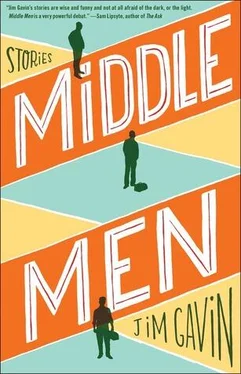Bobby hadn’t slept in two or three days.
He looked around for another table, but the reading room was packed with the elderly and the unemployed. Some people seemed hard at work, or at least pleasantly engaged, but most were either asleep or staring out the windows, as if waiting for something. It felt more like a bus terminal than a library. Bobby wore a Cal T-shirt and a pair of board shorts. He was trying to read a reference manual on patent law, but it was boring and his eyes kept slipping off the page. The hours were melting together. Last night, after Conan , he had fallen into a vortex of infomercials and then, at some point, he snuck off with his roommate’s laptop and sent another pleading email to Nora, his dearest cousin and benefactor. When the sun came up, he left his apartment in the Berkeley flats and rode his bike up University Avenue. He ate breakfast at McDonald’s and when he got to the library at nine o’clock, a crowd was already waiting to get inside. He struggled with his work all day — he kept taking long breaks to read magazines — but his lack of concentration, he knew, had more to do with excitement than fatigue. If anything, he worried that he was too awake.
It was three o’clock. Far up the hill, on campus, the tower bells were ringing. Bobby closed his eyes and listened. As a student, he had always loved the swirling bronze melody of the carillon. Ten years ago he had gone to Cal on a swimming scholarship. He majored in business, pledged a fraternity, and flunked out his junior year.
“See you later,” he said, standing up and collecting his things, but the homeless man ignored him. In his own pungent way, this guy was a snob, and Bobby could respect that. It was a snobbery well earned. When he died alone in a gutter, in a puddle of his own piss, he would take with him a crazed and singular form of expertise. Bobby ran his fingers through his buzz cut. He wished he had a nice hat to doff, a bowler cap or fedora. He hated belonging to such a crude and hatless generation.
He sat down at a computer. His Yahoo mailbox was filled almost exclusively with undeleted spam. Someday, Bobby imagined, a single pill would grow hair, restore virility, and consolidate debt, but until then the market was wide open and he still had a chance to capitalize on his terrible idea. With this in mind, he scrolled down and was relieved to find a response from Nora. He had been trying to reach her all week, to get her advice on how he should go about branding the Man Handle, but she wouldn’t answer her phone or reply to his emails. This happened sometimes. She was director of marketing for a company that sold investment management software. When she was on the road, she closed ranks and forgot about everybody in her life who wasn’t a client or prospect. He would go weeks without hearing from her. Then she would come back to the city, haggard and lonely and claiming that she was sick of her job, that she was ready to meet a decent man and go into full suburban lockdown. Nora was tall and pale and, because of her pixie haircut and listless expression, men often asked her if she was a model. She had actually paid her way through college doing catalogue work, posing in cardigans next to duck ponds, but she liked to tell potential suitors that she was dying of consumption. Bobby and Nora had always been allied by a certain ghoulishness. At his father’s funeral, when they were both seniors in high school, she met him on the front steps of St. Bonaventure in Huntington Beach and said, “Your eulogy sucked.” They rode together from the church, passing a bottle of Jameson back and forth, and when they got to the grave site Nora took off her heels and ran across the expansive lawn, scattering crows like a burst of black confetti.
Now and then she met a guy who appreciated these qualities in her, but it would never last. They either got frustrated with the demands of her career, or she got bored with them. Bobby despised most of the men she dated. She had a weakness for solvent hipsters — architects, creative directors at advertising agencies, and other lieutenants in the corduroy mafia. They all supported progressive causes, not in any active or financial way, but just in general, as a kind of ambience that made them feel good about themselves as they walked around the city in vintage Japanese tennis shoes. And yet, in some ways, Bobby understood the plight of these slender princelings. Nora had a unique gift for turning cold on people.
The last time he saw her was three months ago, in May, when she asked him to accompany her to Geneva Software’s annual Client Appreciation Party. The latest staff restructuring had left the marketing and direct sales teams looking grim and sparse, so her boss, Dave Grant, Executive Vice President and General Manager of Global Accounts, had encouraged the survivors to bring a guest, because the clients would feel more at ease in a full room. “There’s free food for you,” Nora told Bobby. “Just look presentable and keep me entertained.” He got a haircut, wore a gray suit that he found in one of his roommate’s closets, and in a hotel bar overlooking Union Square he shook hands with Nora’s colleagues, mostly men, who seemed weirdly impressed by the fact that Bobby was stuck doing plumbing work. He used to work summers with his dad, doing repair and remodel jobs, so he knew what he was doing most of the time, but he didn’t have a license and he was getting paid under the table by a shady house flipper in Castro Valley who had posted an ad on Craigslist. But still, the men from Geneva software expressed wonder and delight, as if they were shaking hands with a sea captain or gunslinger. When Bobby asked what they did, most seemed vaguely ashamed that they were marketing associates or software engineers; in parting, they all shook his hand with a substantially firmer grip.
Nora introduced him to Dave Grant, who, despite being the boss, seemed nervous and fumbling around her. “That fucker’s in love with you,” said Bobby, as soon as Dave left, and Nora feigned vomiting. They were having a great time. Someone handed Bobby a drink; someone else, mistaking him for a client, handed him a gift bag filled with coffee mugs and key chains emblazoned with the Geneva logo. He watched a stray red balloon wedge itself in the crystal arm of a chandelier. Bobby told Nora that he wanted a job with her company—“I have sales experience,” he reminded her, crushing a lime into his vodka — but then one of her company’s actual clients found her and said hello. Nora turned her back on Bobby and began speaking in tongues. Bobby heard the word “functionality” repeated over and over. She made no attempt to introduce Bobby and for a long time he hovered awkwardly behind her, feeling invisible. When the client finally left, she turned around like nothing had happened. Later, in the cab, Bobby screamed at her, “You literally turned your back on me.”
“It was client appreciation night, not Bobby appreciation night,” said Nora, offering him a sip from the bottle of champagne she had stolen on the way out. When they stopped at a light, he grabbed the champagne bottle and threw it out the window. It smashed against the curb and for a moment they both sat there in silence; then Bobby jumped out of the cab.
He hated Nora for a couple weeks, but kept hoping for her to call and apologize to him. When his cell phone got shut off, he checked his email obsessively, but there was nothing. Since they were kids, growing up a few blocks from each other, they had always fought and made up, and the time in between was pure desolation. But he never heard from her and he realized that he was being overly sensitive and a little self-righteous. He envied Nora’s ability to turn herself on and off, to indulge in vile misanthropy one minute and false pleasantry the next. This golden switch guaranteed her future. She had a great place in the Inner Richmond, and on more than one occasion she had loaned money to her dearest cousin, though both knew it was a donation. She had worked hard to establish her place in the world, while he had made a shambles of his education and drifted from one crappy job to the next. He didn’t have the on/off switch, and he understood now, with thrilling clarity, that Nora’s path to success — corporate, dignified, incremental — would never work for him. Bobby required a bonanza.
Читать дальше












